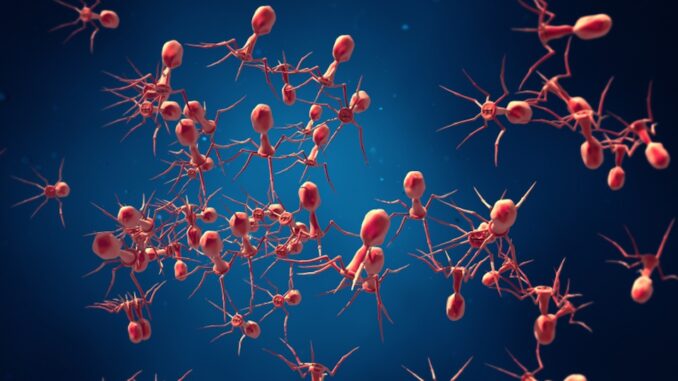
Researchers at APC Microbiome Ireland (APC), a world-leading SFI research centre based in University College Cork (UCC), have made a world-first discovery in the role the human virome plays in stress management. The findings support the development of potential treatments to reduce stress and stress-related disorders through targeting the virome, the vast community of viruses hosted by every human body.
With one in eight people living with a mental disorder across the globe according to the WHO, stress-related psychiatric disorders such as depression and anxiety are extremely prevalent and are significant societal burdens.
Although most people think of viruses in their negative context (e.g. COVID-19, influenza or the common cold) there is a rich ecosystem of other viruses known as bacteriophages that infect bacteria including pathogenic bacteria and can play a vital role in maintaining our health and well-being. Over the past decade a new burgeoning field of research studying the human microbiome has taught us that the microbes living in our guts play a pivotal role in many important aspects of our physical and mental health. Indeed it has been shown that the composition of bacteria in the gut changes with stress and that targeting these bacteria may dampen down the effects of stress in animals and humans. However, up to now all the focus has been on bacteria and viruses have been neglected.
To counter this Prof John Cryan and colleagues teamed up with a leading bacteriophage lab of Prof Colin Hill at APC to decode the relative contribution of these gut viruses to stress. The study published in Nature Microbiology found for the first time that chronic stress led to changes in virome composition that was associated with behavioural, immune and bacteriome alterations. It supports increasing evidence that brain-gut interactions may play a key role in how stress is regulated. Understanding the biological consequences of chronic stress offers potential to develop alternative, new therapies for stress-related disorders.
Next they showed that through a faecal virome transplant (FVT), whereby the harvested viruses from healthy animals prior to stress, and returned then to the stressed gut, was able to exert remarkable outcomes in preventing stress-associated behavioural and physiological outcomes. The research provides strong causal evidence that the viral component of the microbiome can be used to restore the microbiota-gut-brain axis during stress and a potential treatment strategy for stress-related psychopathologies.
Dr Nathaniel Ritz, first author on the study said:
“Although bacteria in the gut has been the subject of growing research, the way the virome interacts with bacteria and how they affect stress-related health and disease status is largely unexplored. Our research focuses on this and highlights a link between stress-related behaviours and the gut bacteriome and virome which opens up the potential to target the virome to treat and reduce the effects of stress.”
Professor Cryan says
“This important research is a step advancement in developing targeted virome therapies that reduce the effects of stress with safer therapeutic interventions, and points to the potential of further research on the dynamics of the microbiota-gut-brain axis to promote gut and brain health”
He also cautions that
“these are mice studies and validation in humans is now required to assess the potential of the FVT approach. However, given that the virome composition varies greatly among individuals, it may open the door for personalised medicine approaches for stress-related disorders in the future. One thing for certain we must acknowledge that not all viruses are bad and they can play a key role in keeping the keep bad bacteria in our gut at bay especially in times of stress.”
APC Director Prof Paul Ross says
“I’d like to congratulate the APC teams involved, The virome is a nascent research area and we are excited at the huge potential there to develop therapeutics. To have established a tangible link with chronic stress at this early stage is a huge advancement and we look forward to deepening this research area.”
Link to Paper: https://www.nature.com/articles/s41564-023-01564-y

